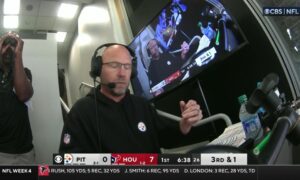The Pittsburgh Steelers brought in Eric Ebron at tight end following a down season from Vance McDonald that was slowed down heavily, in part due to injury, in part due to quarterback play—and in part due to just general performance quality.
But last season doesn’t impact the team’s expectations for McDonald heading into this season, even if most of the attention throughout the past six months has been on Ebron, the new toy, and the player who history has been a bigger threat in the passing game.
“Eric has been really wonderful”, offensive coordinator Randy Fichtner said of his new toy on Thursday, via the team’s media department. “He’s been bringing a lot of energy to practice. He obviously loves to be involved in the passing game. He’s unique in a lot of aspects. He’s got tremendous hand-eye coordination. He’s got tremendous body control”.
Despite Ebron’s presence, however, he is not coming in as ‘the starter’, taking over the primary role at the position. In fact, they are listed as co-starters on the official depth chart, and Fichtner suggested that both of them will see a lot of playing time—both rotationally and on the field together.
“There’s a lot of good opportunities that you can put him in. I would say that he and Vance will play together a bunch”, he said. “I think that them complementing each other when they’re not in, I think the ability to rotate those two is going to be very useful all season long, an attempt to even keep them fresh. You will see them out there together as well as one will be out there when one wouldn’t”.
This is all good to hear, on both fronts. The ability to keep both McDonald and Ebron, who have had some history with injuries, is valuable, but so is the opportunity to open up the two-tight end sets, arguably the most dynamic offense one can run when your tight ends are both receiving- and blocking-capable.
That is why the Steelers have been working Ebron so hard in the blocking department this Summer, something he has admitted has been unlike anything he has seen since his college days, saying essentially that he thought they’d gotten away from that at the professional level.
Despite being regarded as a receiving tight end, Pittsburgh is going to expect him to be able to block, at least somewhat representationally, in the way that they have traditionally asked tight ends to block.
As long as he can do a relatively serviceable job, and force defenses to honor the run option, the two-tight end set will be a really valuable tool in Fichtner’s kit this year. Whether or not he uses it as often as he should, that remains to be seen.








